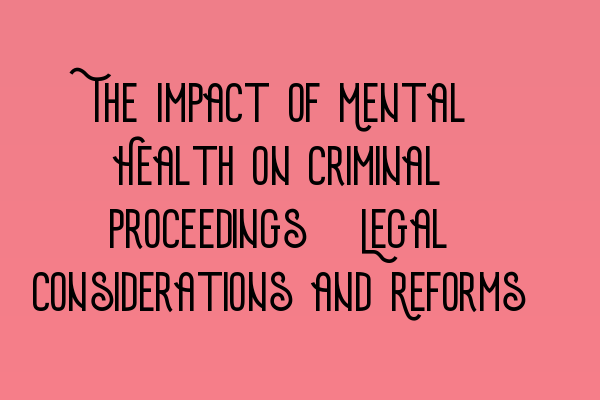The Impact of Mental Health on Criminal Proceedings: Legal Considerations and Reforms
When it comes to criminal proceedings, the impact of mental health cannot be understated. It is a complex area of law that requires a comprehensive understanding of both criminal and mental health legislation. In this blog post, we will delve into the legal considerations and reforms surrounding the intersection of mental health and criminal law.
Mental Health and Criminal Responsibility
One of the key aspects of mental health in criminal proceedings is the determination of criminal responsibility. The law recognizes that individuals with certain mental health conditions may not have the same level of culpability as those who are mentally sound. This principle, known as the insanity defense, can be a crucial factor in determining the outcome of a criminal case.
However, the insanity defense is not without controversy. Critics argue that it may be used as a loophole for criminals to avoid punishment. Proponents, on the other hand, argue that it ensures fairness and considers the individual’s mental state at the time of the offense.
To better understand the legal framework surrounding mental health and criminal responsibility, it is essential to explore the relevant legislation. The Mental Health Act 1983 and the Criminal Justice Act 2003 play a significant role in determining how mental health issues are addressed within the criminal justice system.
The Role of the Court and Sentencing
When mental health becomes a factor in criminal proceedings, the court has an obligation to carefully consider the defendant’s condition. This includes assessing their fitness to stand trial, access to appropriate mental health services, and the potential impact of their mental health condition on sentencing.
It is crucial for legal professionals to advocate for their clients and ensure that mental health considerations are taken into account during the sentencing process. This may involve presenting evidence of the defendant’s mental health history, treatment options, and the potential benefits of diversionary programs or rehabilitative measures.
Relevant reforms have been introduced in recent years to address the shortcomings in the criminal justice system’s approach to mental health. These reforms aim to increase awareness, improve support services, and enhance the coordination between mental health and criminal justice professionals.
The Need for Adequate Resources
One of the key challenges in dealing with mental health issues in criminal proceedings is the lack of adequate resources. This includes the availability of specialized mental health professionals, appropriate assessment and treatment facilities, and funding for mental health programs within the criminal justice system.
Legal professionals play a vital role in advocating for the allocation of sufficient resources to address the mental health needs of individuals involved in criminal proceedings. This can involve working closely with mental health organizations, participating in policy debates, and raising awareness of the importance of adequate support services.
Conclusion
The impact of mental health on criminal proceedings cannot be ignored. It is a complex and challenging area of law that requires a careful balance between addressing the rights of individuals with mental health issues and protecting the interests of society. By staying informed about the relevant legislation, advocating for their clients, and pushing for necessary reforms, legal professionals can play a crucial role in ensuring fair and just outcomes for all parties involved.
Related Articles:
